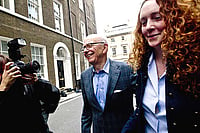More than three years after the phone-hacking scandal was declared a national outrage, the British press is still far from having its jaws muzzled. The more important question—if it at all it should be—remains. Despite a year-long inquiry by Lord Justice Leveson, a senior judge, and an extensive report, the parliament, the courts and the press are at loggerheads over whether Fleet Street’s excesses should be checked by legal statute or an independent regulator. Or whether they should be addressed through introspection by the media. In the latest round of dealmaking, horse-trading and soothsaying, the situation has become even more opaque.
The three big political parties—the Conservatives, Labour and the Liberal Democrats—cooked up a deal just before a landmark parliamentary vote was due in the House of Lords. In the end, the vote was unnecessary, as the deal was agreeable to all, we were told by a beaming David Cameron. Of course it wasn’t. And isn’t.
Several publications—including the right-wing Spectator, the left-wing New Statesmen and the satirical Private Eye—have said they won’t adhere to this deal. The Guardian—which broke the omerta of Fleet Street’s dark arts—is sceptical, but has agreed in principle to accept elements of statutory underpinning, along with the Independent and the Financial Times.
Chris Blackhurst, editor of the Independent, initially seemed relieved that something—anything—had been agreed on. “We’ve had an inquiry that lasted a year, scandals galore,” he said. “If at the end of all that we’ve got this, well, we take our punishment and we move on.” The tabloid Daily Mirror damned the deal for different reasons: “The day the press was shackled”, it said, adding that the path was now cleared for an Orwellian ‘Ministry of Truth’.
But the biggest opposition comes from the biggest-selling groups: Associated Newspapers (the Daily Mail, the Mail on Sunday), News International (the Sun, the Times, the Sunday Times), Northern & Shell (Daily Express, Daily Star) and the Telegraph continue to deliberate on their position, and in a joint statement said there are “deeply contentious issues” yet to be resolved.
This despite the public perception that Cameron and his cohorts are too close to the Murdoch empire—which now is decrying their deal. But then again, the public lost interest long ago, when as George Brock, a former Times managing editor, said “they realised it was a complicated prescription” to fix the things that went wrong.
So there it stands, despite the much ballyhooed talk of a royal charter to form a regulator—which means the statutes would effectively be a ‘back door’ agreement under the aegis of the Queen rather than parliament, hence protecting its independence in the face of changes of governments and their policies on press freedom. Royal charters have been used since the 13th century, and the BBC and the Bank of England operate under their protection.
What happens next is anyone’s guess. Opponents of state regulation repeatedly say offences like phone hacking are already illegal: the problem was that the police were in the pockets of powerful papers like the now-closed News of the World, so they never investigated. Advocates of more press control say that, no matter what is agreed, the buccaneering attitude that has made and kept the UK the most competitive newspaper market in the world will always mean self-regulation will never be effective.
If you corrall cobras, mongooses, octopuses, pythons and tigers in one ring, and keep an eye on their performance, will you ever notice that the audience has left?
By Saptarshi Ray in London





















